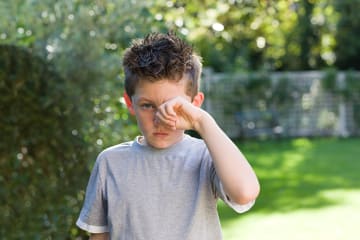Overview

An allergic reaction is an excessive response from your child's immune system to a medicine, chemical, food, insect bite, or other substance. A reaction can range from mild to life-threatening. Some children have a mild rash, hives, and itching or stomach cramps. In severe reactions, swelling of your child's tongue and throat can close up the airway so that your child cannot breathe.
Follow-up care is a key part of your child's treatment and safety. Be sure to make and go to all appointments, and call your doctor if your child is having problems. It's also a good idea to know your child's test results and keep a list of the medicines your child takes.
How can you care for your child at home?
- If you know what caused the allergic reaction, help your child avoid it. Your child's allergy may become more severe each time there is a reaction.
- Talk to your doctor about giving your child antihistamines. If you can, give your child an over-the-counter antihistamine, such as loratadine (Claritin), to treat mild symptoms. Read and follow all instructions on the label. Some antihistamines can make you feel sleepy. Mild symptoms include sneezing or an itchy or runny nose; an itchy mouth; a few hives or mild itching; and mild nausea or stomach discomfort.
- Do not let your child scratch hives or a rash. Put a cold, moist towel on the skin, or have your child take cool baths to relieve itching. Put ice packs on hives, swelling, or insect stings for 10 to 15 minutes at a time. Put a thin cloth between the ice pack and your child's skin. Do not let your child take hot baths or showers. They will make the itching worse.
- Your doctor may prescribe an epinephrine medicine, such as an epinephrine shot or nasal spray, to carry in case your child has a severe reaction. Learn how to give your child the medicine, and keep it with your child at all times. Make sure it is not expired. If your child is old enough, teach your child how to give themself the medicine.
- Take your child to the emergency room every time there is a severe reaction, even if you have given your child their epinephrine medicine and they are feeling better. Symptoms can come back after the medicine is given.
- Have your child wear medical alert jewelry that lists any allergies. You can buy this at most drugstores.
- Make sure that your child's teachers, babysitters, coaches, and other caregivers know about the allergy. They should have the epinephrine medicine, know how and when to give it, and know when to call 911.
When should you call for help?
Watch closely for changes in your child's health, and be sure to contact your doctor if:
- Your child has new or worse symptoms.
- Your child's symptoms are interfering with their daily activities, sleep, or school.
- You have questions about medicines or allergy testing for your child.
- Your child does not get better as expected.
Where can you learn more?
Go to http://www.healthwise.net/patientEd
Enter H218 in the search box to learn more about "Allergic Reaction in Children: Care Instructions".
Current as of: October 25, 2024
Author: Ignite Healthwise, LLC Staff
Clinical Review Board
All Ignite Healthwise, LLC education is reviewed by a team that includes physicians, nurses, advanced practitioners, registered dieticians, and other healthcare professionals.

